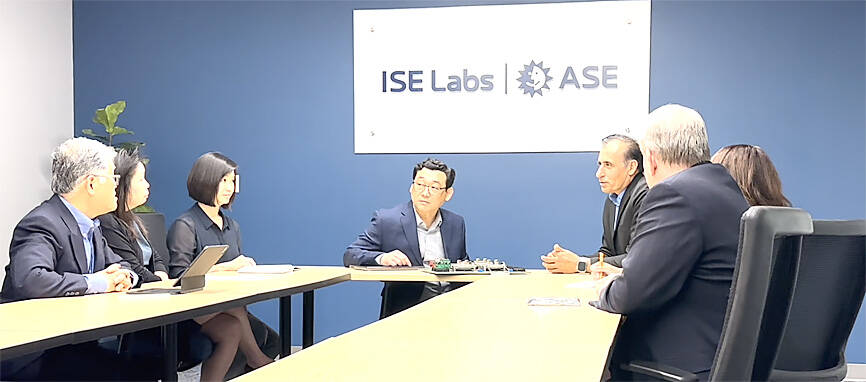ASE Technology Holding Co (ASE, 日月光投控) yesterday launched its second testing facility in San Jose, California, to expand advanced chip testing capacity such as burn-in testing to satisfy customers’ rising engineering needs for emerging semiconductor applications, such as artificial intelligence (AI) and high-performance computing (HPC).
ISE Labs Inc, a fully owned subsidiary of ASE, would operate the advanced testing facility.
When added to its first facility in nearby Fremont, ISE would double its available research-and-development lab and business space to 150,000m2 in hopes of boosting the US semiconductor supply chain, the company said in a statement.

Photo courtesy of ASE Technology Holding Co
“As the semiconductor manufacturing supply chain reshoring continues to escalate, demand for our proven engineering expertise is growing in parallel,” ISE Labs chief executive officer Kenneth Hsiang (項世傑) said in the statement.
“Expanding our operations by adding a second facility is vital to support our growing customers, who are onsite daily due to the collaborative nature of our work,” Hsiang said. “Ease of access in the South [San Francisco] Bay was a key consideration in selecting our new site.”
Numerous customers are working on solutions for AI, machine learning, advanced driver assistance systems and HPC, the statement said.
ISE Labs has spent about US$500 million in the company's US labs and hired more than 200 local employees, company president Jui Ko said. The company expected to invest about US$200 million in the San Jose facility over time in accordance with customers' demand, Ko said.
The San Jose facility would primarily house qualification and reliability processes, including environmental, mechanical, electrostatic discharge, failure analysis, and chip burn-in testing, the statement said.
ISE Labs’ high-power burn-in solutions — vital to detecting early failures in a semiconductor device — are among the best and highest-performing in the industry, it said.
The Fremont site would expand its already robust set of test functions, including automated test equipment program development, test hardware design, device characterization, wafer probing, engineering, pre-production and final testing, and system-level testing, it said.
ASE in April increased its capital spending for the second time, boosting its budget by 10 percent from an earlier estimate of US$2.1 billion to cope with growing demand.
As part of the budget adjustments, the Kaohsiung-based company also planned to allocate a bigger slice of the budget, about 24 percent, for chip testing business from an original estimate of 18 percent to get more non-turnkey solutions business.
ASE is also scouting potential sites to deploy advanced chip packaging capacity in the US, Japan and Mexico, in response to rising demand for improved supply chain resilience amid mounting geopolitical risks, the company said last month.

Sweeping policy changes under US Secretary of Health and Human Services Robert F. Kennedy Jr are having a chilling effect on vaccine makers as anti-vaccine rhetoric has turned into concrete changes in inoculation schedules and recommendations, investors and executives said. The administration of US President Donald Trump has in the past year upended vaccine recommendations, with the country last month ending its longstanding guidance that all children receive inoculations against flu, hepatitis A and other diseases. The unprecedented changes have led to diminished vaccine usage, hurt the investment case for some biotechs, and created a drag that would likely dent revenues and

Global semiconductor stocks advanced yesterday, as comments by Nvidia Corp chief executive officer Jensen Huang (黃仁勳) at Davos, Switzerland, helped reinforce investor enthusiasm for artificial intelligence (AI). Samsung Electronics Co gained as much as 5 percent to an all-time high, helping drive South Korea’s benchmark KOSPI above 5,000 for the first time. That came after the Philadelphia Semiconductor Index rose more than 3 percent to a fresh record on Wednesday, with a boost from Nvidia. The gains came amid broad risk-on trade after US President Donald Trump withdrew his threat of tariffs on some European nations over backing for Greenland. Huang further

Macronix International Co (旺宏), the world’s biggest NOR flash memory supplier, yesterday said it would spend NT$22 billion (US$699.1 million) on capacity expansion this year to increase its production of mid-to-low-density memory chips as the world’s major memorychip suppliers are phasing out the market. The company said its planned capital expenditures are about 11 times higher than the NT$1.8 billion it spent on new facilities and equipment last year. A majority of this year’s outlay would be allocated to step up capacity of multi-level cell (MLC) NAND flash memory chips, which are used in embedded multimedia cards (eMMC), a managed

CULPRITS: Factors that affected the slip included falling global crude oil prices, wait-and-see consumer attitudes due to US tariffs and a different Lunar New Year holiday schedule Taiwan’s retail sales ended a nine-year growth streak last year, slipping 0.2 percent from a year earlier as uncertainty over US tariff policies affected demand for durable goods, data released on Friday by the Ministry of Economic Affairs showed. Last year’s retail sales totaled NT$4.84 trillion (US$153.27 billion), down about NT$9.5 billion, or 0.2 percent, from 2024. Despite the decline, the figure was still the second-highest annual sales total on record. Ministry statistics department deputy head Chen Yu-fang (陳玉芳) said sales of cars, motorcycles and related products, which accounted for 17.4 percent of total retail rales last year, fell NT$68.1 billion, or